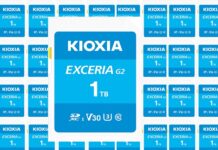Burlywood has added NVMe protocol support for its customisable SSD controller software. And it is easy to see why.
As Tod Earhart, founder and CEO of the flash controller start-up, said, in announcing the move: “With NVMe poised to become the future of storage, we see adding support for that protocol to be an obvious step to take.”
Burlywood last month scored $10.6m in A-series venture funding to pursue its goal of giving hyperscale customers the means to build their own SSDs.
The company’s TrueFlash software supports NVMe drives with up to 100TB capacity. And it claims to be the first to introduce a fully programmable, tunable NVMe flash storage system designed specifically for the cloud data center. In this context the company is using “cloud” as a marketing term for service provider-type data centres.
Burlywood says its SSD controller software has integrated multi-stream quality of service (QoS) and supports data centre needs including NVMe, computational storage and AI.

NVMe for my SSD
Traditionally, SSDs are accessed using storage protocols such as SATA and SAS, which were developed to access disk drives. Typical speeds are 6Gbit/s for SATA and 12Gbit/s for SAS.
NVMe (Non-Volatile Memory express) uses the server’s PCIe bus and so operates much faster, delivering higher bandwidth and better queuing.
Each SATA or SAS controller can have one queue and a depth of 32 for SATA and 254 for SAS. An NVMe controller supports 64,000 queues, each with a depth of 64,000 entries. Such a controller can handle many more IO requests than SATA and SAS controllers without degrading performance.
NVMe bandwidth is around 1Gbit/s per PCIe gen 3 lane and lanes can be grouped so that a 16-lane setup delivers 16Gbit/s. PCIe gen 4 will likely double this. NVMe handles more IO requests and deals with them quicker.
Samsung’s 970 PRO NVMe SSD delivers 3.5GB/sec sequential read and 2.7GB/se sequential write bandwidth with its NVMe PCIe gen 3 x4 lane interface and M.2 form factor. No SATA or SAS SSD can match that.
Burlywood v. CNEX Labs
Burlywood is not the only startup that wants to help hyperscale vendors make their own SSD controllers. CNEX Labs, for instance, is better established and has some big industry backers. Both say they can provide more efficient SSD operation but are taking different approaches.
CNEX is developing skinny NVMe controllers with upper-level functions such as garbage collection carried out by upper-level controller software in a host server or FPGA managing a bunch of SSDs.
Burlywood’s controllers are SSD level and do not rely on offloading functionality to upper, system-level controllers.







